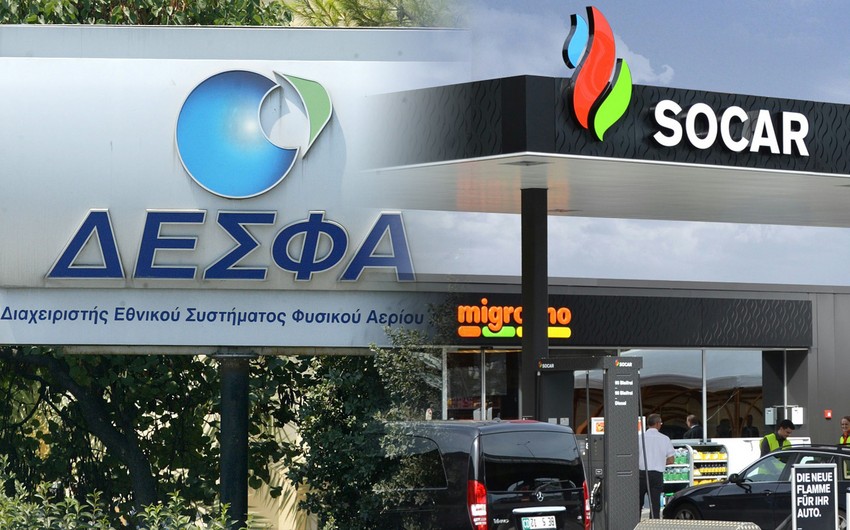Baku. 21 July. REPORT.AZ/ Report presents an interview of Anar Mammadov, CEO of SOCAR Energy Greece S.A.to the Greece media.
- Minister of Energy Panos Skourletis made a statement recently saying that SOCAR wants to make 830M Euro return in the next few years in exchange of its 400 Mln investments in DESFA and demands the transmission tariff to be increased by 68% . Can you comment on this please?
- SOCAR never made such a demand. The increase of 68% derives from the existing tariff calculation methodology and has nothing to do with SOCAR. Moreover, we always said that, as future shareholders of DESFA, we were interested in finding a compromise solution, combining protection of both interests of local gas consumers and preservation of the company’s value. As to 830 Mln issue, we reject these arguments in the firmest possible way. First of all, this is not real money, this amount is not included into DESFA's financial statements. This is a “promise” to the company to compensate it for the amount of funds it was supposed to make in the previous periods, but for some reasons didn’t. Under the ideal situation, these funds would be recovered by DESFA in 20 years period, according to the existing methodology, whose author is certainly not SOCAR, not the next few years, in any case. However, the reality is totally different: this has never happened in the past. Debt to the company has only been growing and we don’t expect the company to recover this amount ever. This is “virtual money”, the only real importance of which is that it is should be taken into account for the calculation of the transmission tariff for the next 4 years.
- We understand that Minister Skouletis proposed some amendments into the existing legislation directly effecting business of DESFA. Were you aware of these changes coming?
- No. This came as a total surprise to us.
- Is it true that TAIPED was also not consulted?
- I am not aware of this
- What is your view on these proposed amendments?
- If implemented, these changes will dramatically reduce value of the company and its future earnings. We estimate that both parameters will go down as much as 50% from the existing level.
- What would be the consequences of these amendments to the privatization of DESFA?
- SOCAR will take a formal position immediately after the law is passed. I can only say at this stage that I do not see how the tender process will be saved, if these provisions go through as planned.
- So what do you suggest?
- We have made our views known through the appropriate channels. All I can say is that we are prepared to continue discussions with the ministry of Energy in order to find mutually acceptable solution, provided that these proposed provisions do not become law.
- Did you communicate your position to the Ministry of Energy?
- Yes, I met with Minister Skourletis this morning
- And how did he react?
- The Minister’s position is very firm, he believes that the amendments are necessary to protect the local gas market, that they will be implemented without any changes, are in strict accordance with national and European law and they have no correlation whatsoever with the privatization process.
- Do you agree with his position?
- We respectfully disagree. Transmission tariff makes only a minimal part of the total price for the consumer. Out of 50Euro per MW average price of 3.2 Euro constitute DESFA’s fee, the rest are taxes and natural gas price. So the impact of the increase even to 68% of 3.2 Euro is negligible. However, in reality we are talking about an increase of1-1.5 Euro per MW only. In any event, SOCAR is prepared to show some flexibility here. What we cannot accept is to sit and watch the company lose 50% of its value. Allow me not to pass judgment/comment on the legal arguments raised. SOCAR has its own position here, both with regard to the specific questions and with regard to the functioning currently of the overall energy regulatory regime in Greece.All I can say is that SOCAR, as a foreign investor, expects continuity, independence of the competent regulatory authorities and fair treatment. DESFA needs some profit to expand its network and to reach consumers who are currently heavily overpaying for other, more expensive types of fuel like diesel and fuel oil. If DESFA is stripped out of cash and is not able to develop, is this going to serve the interest of Greek gas market and consumers? As to the correlation with the privatization process, I am afraid the correlation is evident and very strong. We bid back then for a company whose value will now be artificially reduced by half by law.
- I understand that you also have a third party investor to the deal, what was his reaction?
- We have more than one interested party. Our views coincide. The price offered during the tender procedure does not make economic sense under the new circumstances.
- So what is your next step is going to be?
- We want to finalize the privatization deal. We like the company, we like the people, we understand business. But we are not prepared to do this on any terms. We are prepared for a dialogue and happy to provide the necessary technical expertise to find mutually acceptable solution. But we need to be listened to and not ignored.


 https://images.report.az/photo/89e35361-886d-4808-b9c7-e6a628e9dae3.jpg
https://images.report.az/photo/89e35361-886d-4808-b9c7-e6a628e9dae3.jpg

